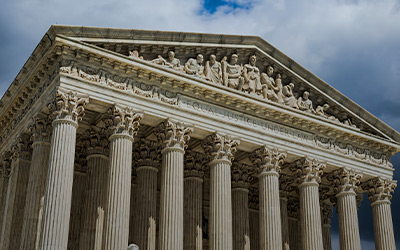The Affordable Care Act (ACA) survives the latest challenge to its constitutionality. In a 7-2 decision, the Supreme Court upheld the ACA in its entirety. Texas and 17 other States were later joined by two individuals (Neill Hurley and John Nantz) who brought this lawsuit against the United States and federal officials. According to the Court’s ruling, Texas and the other plaintiffs do not have standing to challenge the ACA’s constitutionality.
In December of 2018, Judge Reed O’Connor of the U.S. District Court for the Northern District of Texas (District Court) ruled in Texas v. United States.
The District Court opinion concluded that when Congress passed the Tax Cut and Jobs Act of 2017 (TCJA) setting the individual mandate penalty to zero dollars, both the U.S. Constitution and federal law no longer protected the provision. Judge O’Connor stated that the individual mandate was no longer a tax but an illegal order requiring consumers to purchase a commercial product. He further held that because the ACA contained no “severance clause” – a provision that guarantees the remaining provisions of a law survive if one part is struck down – striking the individual mandate as unconstitutional invalidated the entire ACA. Thus, based on Judge O’Connor’s ruling, the ACA as a whole is unconstitutional, and its protections and requirements are void.
The case was appealed to the Fifth Circuit Court of Appeals (Circuit Court) on December 18, 2019.
The Circuit Court issued a 2-1 opinion that partially agreed with the District Court’s decision. The Circuit Court agreed with the lower court that the individual shared responsibility mandate is indeed unconstitutional because the TCJA zeroed out the penalty. However, the Circuit Court remanded the case to the District Court to reconsider whether some or all of the ACA can survive without an individual mandate.
On Monday, March 2, 2020, the Supreme Court of the United States (SCOTUS) agreed to hear Texas v. United States and provide a final ruling in the controversy.
Oral arguments refer to the portion of the appeals process where lawyers from the appealing parties present their legal reasons for why their side should prevail. The Supreme Court denied an expedited hearing request and chose to hear arguments during its 2020 Fall term. According to the SCOTUS Docket for No. 19-840, California, et al., Petitioners v. Texas, et al., the questions presented to the Court for resolution were:
- Whether the individual and state plaintiffs, in this case, have established Article III standing to challenge the minimum coverage provision in Section 5000A(a).
- Whether reducing the amount specified in Section 5000A(c) to zero rendered the minimum coverage provision unconstitutional.
- If so, whether the minimum coverage provision is severable from the rest of the ACA.
SCOTUS heard oral arguments about the case during its October 2020 hearings to resolve the aforementioned issues. During oral arguments it appeared several Justices were in favor of upholding the ACA. A link to the transcripts of the oral arguments can be found here.
The Court issued a 7-2 decision on California et al. v. Texas et al. on June 17, 2021.
The California et al. v. Texas et al. case revolved around two issues the (1) constitutionality of the ACA after the TCJA set the individual mandate penalty to $0, and (2) whether at least one plaintiff and one defendant in the case have the standing to bring or defend the lawsuit. The Chief Justice John Roberts and Justices Clarence Thomas, Sonya Sotomayor, Elena Kagan, Brett Kavanaugh, and Amy Coney Barrett agreed with an opinion written by Justice Steven Breyer. The majority of the Court decided that the individual and state plaintiffs failed to demonstrate, standing, which is a past or future legal injury fairly traceable to the federal government enforcing the specific statutory provision of the ACA, the individual mandate, that they asserted was unconstitutional. Justice Breyer’s opinion concluded that the Supreme Court is reversing the Fifth Circuit’s judgment in respect to standing, vacating the judgment, and remanding the case with instructions to dismiss.
The plaintiffs sought a declaratory judgment that the zeroed out minimum essential coverage penalty (the individual mandate) made the entire ACA unconstitutional.
The only relief or remedy that the plaintiffs sought regarding the individual mandate penalty was declaratory relief. The States and individuals wanted a judicial statement that the provision of ACA they were challenging was constitutionally invalid, thus invalidating the entire law. The Court’s majority opinion stated that it would not need to make a decision on this issue because the seven majority Justices ruled the plaintiffs lacked standing. According to the Court, like in any other lawsuit for every other type of remedy, declaratory relief actions must satisfy the Constitution’s Article III’s case-or-controversy requirement, standing.
The Court dismissed the case because it ruled that none of the plaintiffs demonstrated the requisite standing.
Standing is the legal concept that requires parties bringing or defending a lawsuit to have a legal interest or injury in a matter that permits them to file or defend a lawsuit. The Article III standing requires a plaintiff to:
- Have personally experienced some actual or threatened injury;
- Be able to show that the alleged injury can fairly be traced (connected) to the challenged action of the defendant; and
- Demonstrate that the injury is likely to be redressed by a favorable decision of the Court hearing the case.
Justice Breyer wrote that unenforceable statutory language alone is not sufficient to establish standing, as the redressability requirement makes clear. He further wrote that whether a legal harm or injury is redressable depends on the relationship between the judicial relief requested and the injury suffered by the plaintiff(s). Justice Thomas also wrote a concurring opinion in which he agreed that the plaintiffs failed to demonstrate that the harm they could trace to some unlawful conduct by the federal government’s enforcement of the individual mandate.
The Court stated that since the plaintiffs did not have standing to bring the case to court in the first place, it was unnecessary to rule on other details of the case.
The majority and concurring opinions of the Court found that the individual plaintiffs’ argument on standing failed because the challenged statutory provision tells individuals to obtain minimum essential coverage, but has no means of enforcement. The Court held that the State plaintiffs did not have standing because they did not show how the $0 mandate caused the States, as entities, a direct injury resulting from a variety of increased administrative and related expenses. According to the Court, the States also failed to connect how enforcement of ACA without a penalty caused them to allege indirect injury in the form of increased costs to run state-operated medical insurance programs. Further, the majority stated that to find standing to attack an unenforceable statutory provision would allow a federal court to issue an unconstitutional advisory opinion without a remedy.
The Court also declined to consider a new theory of standing advanced by the plaintiffs. In its opinion, the Court stated that the plaintiffs failed to timely raise and argue their novel alternative theory of standing. Justice Thomas, in his concurrence, stated that the Court should not address the standing-through-inseverability argument for several reasons. He said it was not justiciable because the theory was not raised in the lower courts or their briefs, and the courts have not addressed the issue in any detail at any point before. Plus, Justice Thomas stated that in previous cases the Court was inconsistent in describing whether inseverability is a remedy or merits question. Consequently, the Court could not decide to provide the relief sought by the plaintiffs
The Court did not settle the question of whether the $0 individual mandate penalty affects the ACA’s constitutionality.
The majority opinion stated that the Court did not need to reach the questions of the ACA validity because the plaintiffs lacked the standing necessary to raise them. The dissent written by Justice Samuel Alito and agreed to by Justice Neil Gorsuch stated that the theory of standing advanced by the plaintiffs had merit and the Court should grant the relief requested by the plaintiffs. According to the dissent, the Court had the necessary precedent to entertain the theory of standing and relief requested by the plaintiffs.
The Court ended what it called the third installment of the ACA trilogy.
Justice Breyer, writing for the majority, stated that the Court did not need to proceed any further than standing to decide the merits of the case. In his concurrence, Justice Thomas agreed, stating the plaintiffs failed to demonstrate that the harm they suffered is traceable to unlawful conduct. Moreover, he said that although in his opinion, the Supreme Court erred in its previous two rulings on the ACA, it was correct to dismiss the current ACA case based on the lack of standing. However, the Supreme Court ruling in California et al. v. Texas et al. adjudicates the particular claims the plaintiffs chose to bring based on the standing theories the Court rejected.
EPIC offers this material for general information only. EPIC does not intend this material to be, nor may any person receiving this information construe or rely on this material as, tax or legal advice. The matters addressed in this document and any related discussions or correspondence should be reviewed and discussed with legal counsel prior to acting or relying on these materials.
Sign up for our Compliance Matters Newsletter
You’ll receive our monthly newsletter, as well as special compliance alerts and invitations to our compliance webinars
Related Content
Products
Employee Benefits Consulting
Our dedicated benefits team is focused on delivering better outcomes – to both your benefits program and ...
Products
Compliance
We provide comprehensive consulting services and in-depth education regarding the ever-changing employee ...
Products
Actuarial
Our Actuarial Team provides guidance on employee benefits and health and welfare programs to help meet ...



